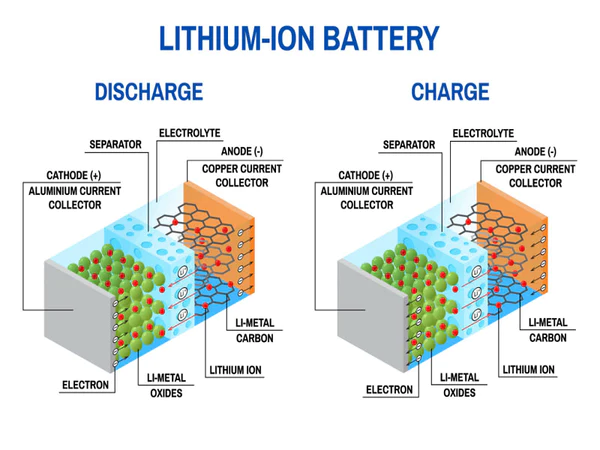Lithium-ion batteries have revolutionized energy storage, powering everything from portable electronics to electric vehicles and grid storage. Over recent years, there have been significant advancements in lithium-ion technology, enhancing their energy storage capabilities. These improvements focus on increasing energy density, lifespan, safety, and environmental sustainability. Let’s delve into some of these key advancements:

Increased Energy Density
- High-Nickel Cathodes: Developing cathodes with a higher nickel content, reducing cobalt and other materials, improves energy density and reduces costs.
- Silicon-Anode Technology: Incorporating silicon into the anode significantly increases the battery’s capacity as silicon can store more lithium ions than graphite, which is commonly used.
- Advanced Electrolytes: New electrolyte formulations, including solid-state electrolytes, enhance the efficiency and energy density of lithium-ion batteries.
Improved Lifespan and Durability
- Solid-State Batteries: Replacing liquid electrolytes with solid electrolytes can lead to batteries that are more stable, safe, and have longer lifespans.
- Battery Management Systems (BMS): Advanced BMS use algorithms to optimize charging and discharging processes, extending the battery’s life.
- Electrode Material Innovations: Developing new materials or coatings for electrodes can reduce degradation over time, thus enhancing the battery’s lifespan.
Enhanced Safety Features
- Flame-Retardant Electrolytes: Developing non-flammable electrolytes reduces the risk of battery fires and improves overall safety.
- Advanced Battery Architecture: Designing batteries with built-in safety mechanisms, like pressure relief valves and thermal runaway prevention features.
- Improved Thermal Management: Systems that efficiently manage the battery’s temperature prevent overheating, one of the primary safety concerns with lithium-ion batteries.
Environmentally Friendly Developments
- Cobalt Reduction: Reducing the amount of cobalt in lithium-ion batteries addresses both ethical and supply concerns associated with cobalt mining.
- Recycling Technologies: Advances in recycling technologies improve the recovery of valuable materials from spent batteries, reducing the environmental impact.
- Sustainable Material Sourcing: Research into more sustainable and less harmful materials for battery construction is ongoing.
New Applications and Market Growth
- Electric Vehicles (EVs): Improved lithium-ion batteries are key to increasing the range and efficiency of EVs, making them more appealing to consumers.
- Grid Storage: Higher capacity and more durable batteries are crucial for storing renewable energy, like solar and wind power, enhancing the reliability of green energy sources.
- Consumer Electronics: Continued miniaturization and efficiency improvements are vital for the evolving demands of consumer electronics.
Future Directions
Ongoing research in lithium-ion technology is focusing on improving all aspects of battery performance. This includes developing completely new types of lithium-based batteries, like lithium-sulfur or lithium-air, which could offer even higher energy densities and lower environmental impacts.
In summary, advancements in lithium-ion batteries are central to the evolution of energy storage technologies. These improvements are not just about better batteries but also about fostering a more sustainable, efficient, and safer energy future.
